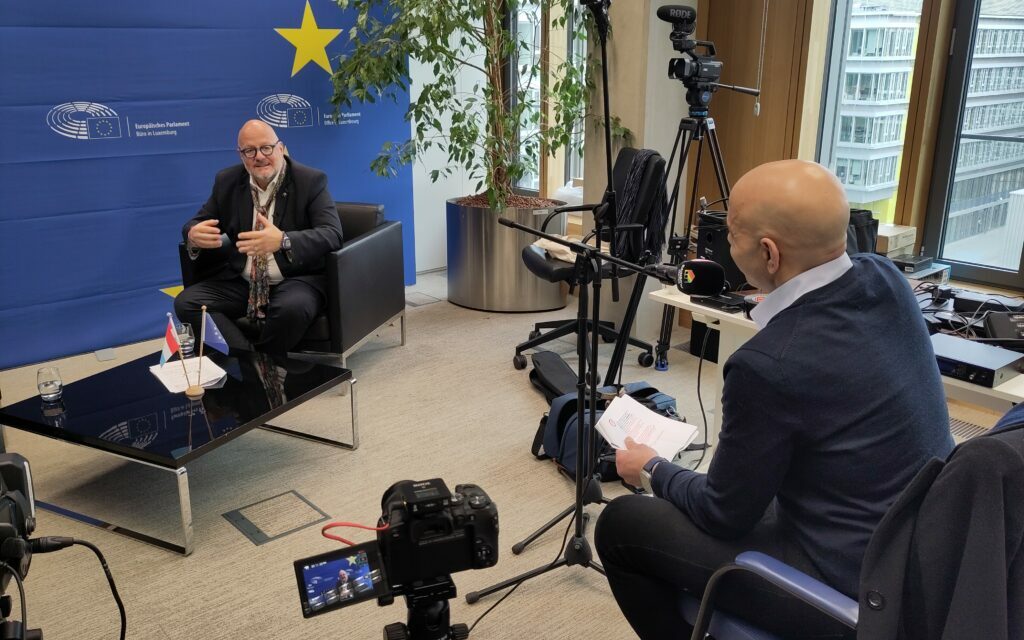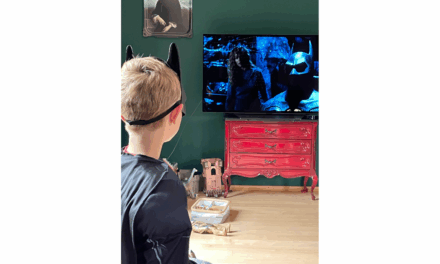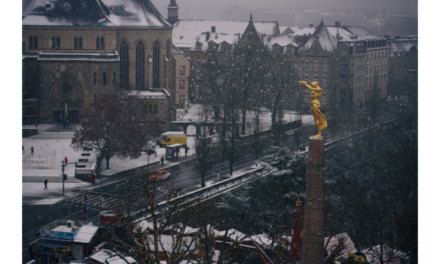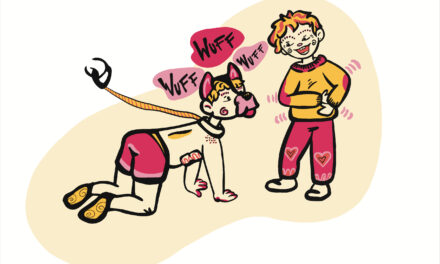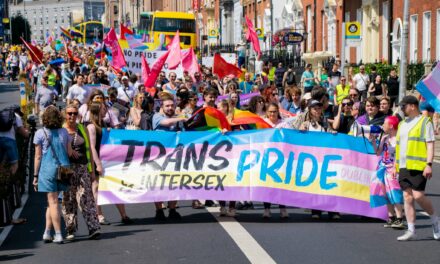In this exclusive interview, queer.lu visited the European Parliament’s bureau in Luxembourg on 23 January to discuss the challenges facing the LGBTIQ+ community in Europe and beyond with MEPs Tilly Metz and Marc Angel.
Tilly Metz is an MEP for Luxembourg’s Green Party (déi gréng), while Marc Angel sits for the LSAP/S&D, and is a Vice-President of the European Parliament. Both are active members of the Intergroup on LGBTI rights, an informal group monitoring the situation of lesbian, gay, bisexual, transgender and intersex (LGBTI) people in the EU and liaising with civil society groups to relay their concerns at the European level.
Kusaï Kedri: My hope is to talk to you about the LGBTI community in Europe, the hopes of our community, their fears and the way you see the reality of our struggle going. Let’s start with a report that was released in 2019 by the Agency for Fundamental Rights in Europe that carried out a research of over 140,000 people in the 27 member states plus the UK, North-Macedonia and Serbia. The purpose of this survey is to ask people who identify as LGBTI about their emotions, their feelings vis-à-vis their day-to-day life, and the reactions were quite ominous. I am going to read to you some of the findings of this report.
- One in three LGBTI people say they have difficulties making ends meet.
- One in five report being discriminated against at their work and the situation is even worse for our trans sisters, brothers and siblings.
- Six out of ten say they avoid holding hands in the street and one out of five particularly within the trans community say they were physically attacked.
As openly gay and lesbian people, do these statements resonate with you? Have you ever lived through these kinds of hardships that have been reported across Europe?
Marc ANGEL: I was brought up here in Luxembourg and my family was very open, so I never experienced this, but this is the reality, not only in Central and Eastern Europe, but almost in all member states of the European Union.
Tilly METZ: I would say the same thing as Marc, but I am aware of the findings of the report and I believe that in crisis times, people tend to stick to the very traditional and are afraid of everything that goes out of the frame.
One might expect that younger generations would be more accepting of coming out, but the same fears seem to linger, even in Luxembourg, not to mention countries with LGBTIQ-free zones or where it is even forbidden to talk about LGBTI issues in schools, like in Hungary.
Marc ANGEL: I work a lot with Transgender Europe and with trans people within our LGBTIQ Intergroup and I can confirm that the situation is even worse for them,
but, on the other hand, I would like to note that there’s also good news. The last Eurobarometer shows that there is more and more tolerance of the general public
vis-à-vis LGBTIQ persons, despite the backlash from the far right, from the anti-gender movement.
KK: As EU policymakers and members of the European Parliament LGBTI Intergroup, how do you address the frustrations and outright fear that we hear from some LGBTIQ+ members?
Marc ANGEL: As co-chair of the Intergroup I can say we’ve been very active. We have 160 members of the European Parliament in our Intergroup out of 705. Of course, they are not all LGBTI community members, but they are allies and this is very important. In the last EU mandate from 2019 to 2024, we passed 150 resolutions which were wholly or partly dealing with LGBTI issues. We also have been pushing new LGBTI legislations and resolutions. As EU rapporteur for the Luxembourg equivalent of the ”Centre d’Égalité de Traitement” which aims to strengthen equality and guarantee more independence within bodies of the EU, we strive to fight various forms of discrimination and we managed to introduce a directive that addresses not only sexual orientation, but also gender identity, gender expression and sex characteristics and this is important, because the trans community and non-binary individuals are not really included yet in the treaty and in the fundamental rights charter. I am also working on pay transparency to close the gender pay gap. When we talk about men and women now in 2024, it’s men and women in all their diversity… So we’re getting a bit out of this binary, into a more linear system.
KK: Tilly, Marc mentioned the legal recognition of non-binary and intersex people. Can you tell us more about efforts to recognize these genders?
Tilly METZ: I understand that they still feel left out, even though there are efforts to introduce new legislation that carries a comprehensive approach to gender identities, as Marc mentioned. It is important to push legislation that addresses non-binary and intersex people explicitly. Just to give you an example, I was shadow rapporteur on the platform workers in the transport committee and there, recently AI has begun to distribute tasks, that’s why we need to be very careful to make sure that AI does not discriminate based on gender identity. I was also a rapporteur on the EU’s SoHO Regulation which ensures better protection for donors and recipients of blood, tissues, cells and any other substances of human origin. There too, we worked hard to make sure there is an end to discrimination against LGBTIQ+ people.
KK: Marc, your work as MEP involves cooperation with countries outside of the EU where homosexuality is a sin and can be punished by law, with sentences that could reach the death sentence. How do you cooperate with these countries?
Marc ANGEL: We had a resolution not long ago on decriminalization of same-sex relationships when an anti-LGBTIQ+ law was passed in Uganda with a death sentence for same-sex acts. We also work together with the European External Action Service, which is the European foreign arm with a special ambassador for diversity and inclusion and we try to support civil society in these countries. I have recently visited Angola where I met with LGBTIQ+ civil society organization Iris. Angola has recently moved to decriminalize same-sex relations and it’s a major step. The problem is with this international Anti-Gender Movement which is putting money in a lot of African countries in an attempt to make it harder for LGBTIQ+ people and we have to resist this. I am also an AIDS activist and when I visit Africa or other parts of the world, I always try to encourage them to take care of the key populations, of men having sex with men, of drug users, of sex workers who have to get equal access to treatment. When I raise these issues, I am sometimes told that these problems do not exist in their countries and that we want to impose these issues on them. We need to have candid conversations with them and remind them that these problems exist everywhere.
KK: Tilly, how about the European Union? Some countries within the EU are trying to roll back on LGBTIQ+ rights. How do you deal with these countries that supposedly share the same European values?
Tilly METZ: I think it’s very important to give them a very clear message that this does not correspond to European values. If they start setting up LGBTIQ free zones [editor’s note: in reference to Poland], we tell them we are for LGBTIQ freedom zones. At the institutional level, we have to make clear that we will defend European fundamental rights. If a country does not respect European values, we need to talk about sanctions and remind them that this is not the way to function. At the local, national and EU levels, the consequences must be very clear. Now, as regards Poland, we see there is hope again. I met with LGBTIQ+ people in Poland, who were considering leaving their country, because they were no longer feeling safe, despite having comfortable lives and steady jobs. And I wish to add that despite the fact that we are making progress with LGBTIQ+ rights, the most important challenge remains at the level of mentalities which are still reluctant to change. Mentalities have to change and there still is a lot to do on the ground, even on our own school playgrounds, there still is a lot of name-calling against the LGBTIQ+. Just because it is written down does not mean that people’s mentalities will automatically follow suit. There is still work to do.
Marc ANGEL: I’d like to get back to the case of Hungary as regards LGBTIQ+ laws, and the so-called child protection law which is a copy of the Russian anti-LGBT propaganda law. The EU Commission has finally brought Hungary in front of the European Court of Justice with the support of 15 member states, a first in EU history. This shows that not only the parliament, but also in the council, member states do not want this to happen on their watch. We are blocking money to Hungary until we see the outcome of the court case.
KK: Let’s talk about the upcoming European elections. The LGBTIQ+ vote in local, national and soon to be held EU elections is gaining traction, probably thanks to the fact that more and more queer people are coming out and feeling comfortable about it. What’s your message to those with voting rights but do not feel concerned?
Tilly METZ: I think polls are showing clearly that there is a risk of a far-right push in the next EU elections and I believe it is very important that we tell the people the very consequences for the EU, if the far-right gets more power. There is a risk of a backlash on LGBTIQ+ rights. It’s more important this time than ever to go out and vote. Obviously, in some EU countries such as Luxembourg, the vote is mandatory [editor’s note: for Luxembourgish citizens], but it’s important to remind people that, if they do not want to live in a Europe where the rights we have been fighting for are now diluted or even deleted, then now is the time to show that and vote for progressive, open, inclusive politics and politicians.
Marc ANGEL: I would tell them: certainly Europe is not perfect, but let us make it better together and stand up to those who want to destroy this wonderful project. What happens when far-right people are in power? Look at Italy and the record of Prime Minister Meloni, where a non-biological mother lost custody of her children following the death of her spouse. That’s terrible and cruel. Some countries are trying to scapegoat the LGBTIQ+ community to divert the attention of the public from corruption and mismanagement. What’s even more alarming is the attempt to whitewash the far-right. We see more EU countries where the center-right parties enter into coalition with the far-right without blinking an eye, not to mention the rise of hate speech among politicians and we know all too well that hate speech is often followed by hate crimes. Therefore, my message to EU residents in Luxembourg: you have the possibility to register and vote here or in your own country, so please go out and vote.
KK: Let’s gay it up a little with this lighter set of questions. As elected officials much of the meaning in your lives comes from your job. How do you balance this with your personal lives?
Tilly METZ: I always say I feel a little bit like a nomad. I live between three cities:
Strasbourg, Brussels and Luxembourg and my wife, who is also an MP here in Luxembourg, has a lot of responsibilities too, so it is really hard to find moments where we spend time together. Particularly now with the elections, but it is very important to find those moments. And we do find time to spend some quality time with our dogs, our families and my daughter.
Marc ANGEL: It is not easy for the partner of a politician, but I am very lucky to have a fantastic husband who supports me very much. He is very patient. When I am in Luxembourg, we enjoy quality time together. During the week my agenda is organized by my office as vice president of the European Parliament, but on weekends he organizes our private agenda: where we go out to dinner, which invitations we accept, and which movies we go to watch. This gives me a wonderful balance and I am very proud of him. It is always good to know that you have somebody who loves you back home and on whom you can count.
KK: I want you now to think of a man, a woman, a gender non-conforming person that you wish to see on a potential European banknote. Who would that be?
Marc ANGEL: I have a friend in Budapest. Her name is Vicki and she is the organizer of Budapest Pride. She is a very strong and committed person in a difficult environment. She was able to organize wonderful Prides and is politically very active. For me, Vicki would be a wonderful candidate for a European banknote.
Tilly METZ: I must say although the person of choice is not part of my political party, I have a lot of respect for Colette Flesch. Not only was she pro-European, but she was one of the first persons who did not shy away from who she was. She was in love with a woman and she did not hide from it and in doing so, she broke many barriers.
KK: Coming out is tough, staying in the closet is even tougher. Do you remember the first person you came out to?
Tilly METZ: Definitely, I do. I was married to a wonderful man and I fell in love with a woman, so he was the first person to know about it and it was not an easy moment, but I knew I loved that woman and I still do and there is no way I could go back on that. But I believe that one of the reasons behind our strong friendship today is the fact that I talked to him pretty soon about it.
Marc ANGEL: I remember when I told my dad I was gay at the age of 17. He said: “No worries, I knew that for a long time”. As I said earlier, I was very lucky growing up in a very progressive family. My father was the founder of the family planning movement back in the 60s. I was lucky in my high school too. When I came out to my peers back in 1981, I was never bullied because of it.
KK: What word do you love the most?
Tilly METZ: Tolerance, Acceptance.
Marc ANGEL: Happiness.
KK: What word do you detest?
Tilly METZ: Abus de pouvoir, Misuse of power.
Marc ANGEL: Hate.
KK: What sound do you like the most?
Marc ANGEL: The sound of music.
Tilly METZ: I like it when my dogs are laughing. I don’t know how to describe it, but when they are happy, they have a very specific sound. It’s like they are laughing.
KK: What is your favorite drug?
Marc ANGEL: Drink?
KK: Alcohol, coffee, work, sex?
Marc ANGEL: If sex is a drug, then why not sex, or a good glass of red wine.
Tilly METZ: I think, my passion is a kind of drug too. I need to be passionate, about people, about causes. It’s like a drug for me.
KK: What job would you have hated to do?
Marc ANGEL: Minister of Education. No, I am kidding. It is a difficult job and I say it, because I was a teacher and know how difficult it can be. As I said, I don’t like the word hate, because you can make something good out of everything, so there is no job I would have hated. Every job is good, as long as you enjoy waking up every morning to go to work.
Tilly METZ: Bailiff. I find it so hard. Probably somebody has to do it, but that’s a job I could never do.
KK: If you were to be reincarnated in an animal, plant or a tree, what would that be?
Marc ANGEL: I was a dog person before I had a cat and now I also became a cat person, so either a cat or a dog.
Tilly METZ: Well, I love every animal from the spider to … but if you really ask me what I would like to be, I would like to be a bird. I would like to fly.
KK: Finally, if you were a believer, what would you wish God to tell you once you are dead?
Tilly METZ: I would like that he would just tell me: you did your best.
Marc ANGEL: Exactly the same thing. A thank you for what you did and maybe you could have done better. I would accept that.
KK: That brings us to the end of this interview. Tilly METZ, Marc ANGEL, thank you so much for your time with us.
Photo: Rainbow Center

